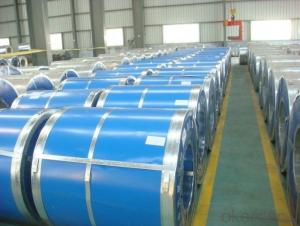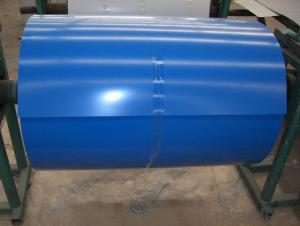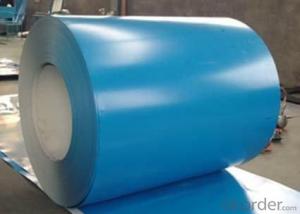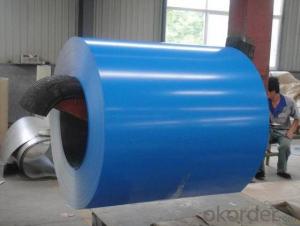RAL Scale Z70 Prepainted Rolled Steel Coil for Construction Roofing
- Loading Port:
- Shanghai
- Payment Terms:
- TT OR LC
- Min Order Qty:
- 25 m.t.
- Supply Capability:
- 28000 m.t./month
OKorder Service Pledge
OKorder Financial Service
You Might Also Like
Structure of RAL Scale Z70 Prepainted Rolled Steel Coil for Construction Roofing
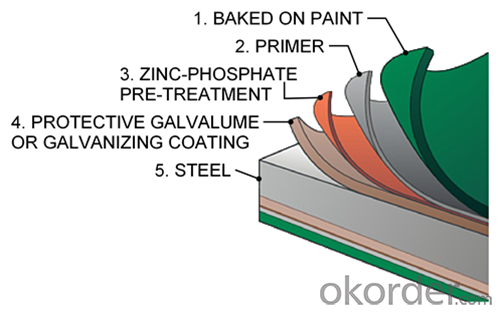
Description of RAL Scale Z70 Prepainted Rolled Steel Coil for Construction Roofing
Prepainted Rolled steel Coil is a kind of coated steel coil/sheet. With the cold rolled steel of different strength and thickness as substrate, it is produced through applying Al-Zn coat on both faces by hot dip process. In its coating, Al accounts for about 55%, Si 1.6%, while the remaining is Zn. Aluminum zinc coils enjoys both the physical protective feature and durability of Al and the electrochemical protective property of Zn. And its surface has bright silver color and regular embossed-like figure, which are highly decorative.
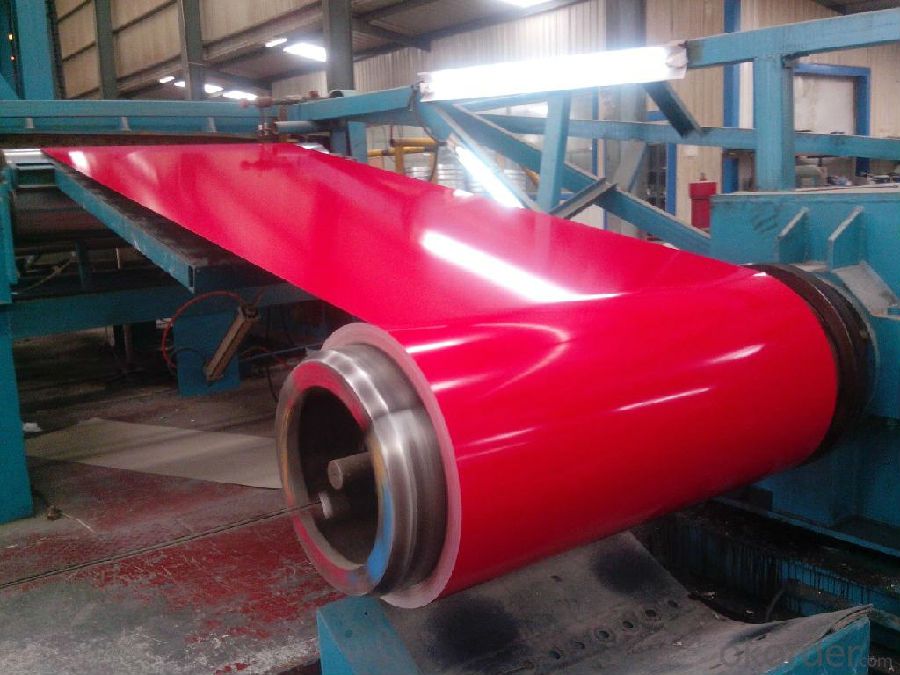
Main Feature of RAL Scale Z70 Prepainted Rolled Steel Coil for Construction Roofing
1.Corrosion resistance: It mainly depends on the aluminum protection. When the zinc being worn, the aluminum will form a dense layer of aluminum oxide, resist corrosion material to prevent further corrosion inside.
2. Heat resistance: Aluminum zinc alloy steel sheet has excellent heat resistance, can withstand high temperatures over 300 centigrade, and is similar with aluminized steel high temperature oxidation resistance. It often used in chimney pipes, ovens, fluorescent lighting device and the device cover.
3. Heat reflective: Galvanized steel plate heat-reflective high rate is twice as galvanized steel, often used to make insulation materials.
4. Economy: Because density of 55% AL-Zn is smaller than the density of Zn, so in the same weight and thickness of Galvanized zinc layer, aluminum-zinc steel plate is larger area more than 3% of galvanized steel sheet.
Applications of RAL Scale Z70 Prepainted Rolled Steel Coil for Construction Roofing
1. Construction and building: roofing; ventilating duct; handrail; partition panel;etc.
2. Electric appliance: refrigerator; washing machine; refrigerator; DVD;etc.
3.Transportation: oil tank; road sign; etc.
4.Agriculture:barn; etc.
5.Others:vending machine; game machine; etc.
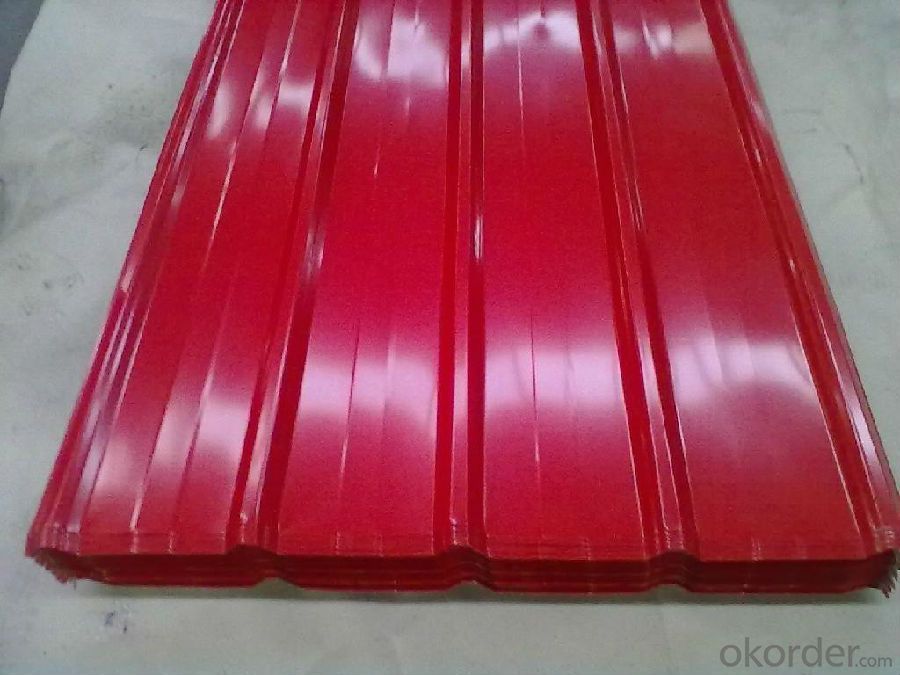
Specifications of RAL Scale Z70 Prepainted Rolled Steel Coil for Construction Roofing
Product | RAL Scale Z70 Prepainted Rolled Steel Coil for Construction Roofing |
Material Grade | SGCC / SGCH / DX51D+AZ, etc |
Thickness | 0.2-3.0mm |
Width | 600-1500mm |
Tolerance | Thickness: +/-0.02mm , Width:+/-2mm |
Zinc-coating | AZ40-150g/m2 |
Technique | Raw material: Hot rolled steel coil --> Cold rolled_>hot dipped galvalume |
Surface | Dried, Chromated, Unoiled |
Spangle | Regular spangle , small spangle, zero spangle |
ID | 508MM |
Coil weight | 25MT max |
Export package | Cardboard inner sleeves, Waterproof paper, galvanized steel covered and steel strip packed |
FAQ of RAL Scale Z70 Prepainted Rolled Steel Coil for Construction Roofing
We have organized several common questions for our clients,may help you sincerely:
1. What is the minimum order quantity ?
Our MOQ is 50mt for each color. And we could give more discount if you make big order like 1000 tons and more. Further more, the more appropriate payment term your can offer the better price we can provide.
2. How long can we receive the product after purchasing?
Usually within thirty working days after received buyer’s advance payment or LC. We will arrange the factory manufacturing as soon as possible. The cargo readiness usually takes 15- 25 days, but the shipment will depend on the vessel situation.
3. How to guarantee the quality of the products?
We have established the international advanced quality management system ,every link from raw material to final product we have strict quality test;We resolutely put an end to unqualified products flowing into the market. At the same time, we will provide necessary follow-up service assurance.
- Q:I just purchased this Benchmade knife with m390 steel blade and it cost me a fortune but I wanted to know if this new steel is a tool steel. what classifies a tool steel. M390 = 1.9 carbon, 20. chromium, .30 manganese, 1. molybdenum, .60silicon, .60 tugsten, 4. vanadium at 60-62 HRC
- Not all tool steels work well in knife blades, but some of them are very popular. D2, M2, M4 and many others.
- Q:What are the common defects in steel coils?
- During the manufacturing or handling processes of steel coils, several defects commonly occur. These defects have the potential to impact the quality and performance of the steel, making it crucial to identify and resolve them to ensure the production of top-notch steel products. Some of the typical defects found in steel coils are as follows: 1. Edge waves or buckles: This defect arises when the edges of the steel coil become wavy or buckled. It can be caused by improper winding, uneven cooling, or excessive tension during the manufacturing process. Edge waves can pose challenges in further processing and compromise the appearance of the final product. 2. Coil breaks: Coil breaks refer to longitudinal breaks or cracks that emerge in the steel coil due to excessive strain or stress. Improper winding, uneven cooling, or excessive tension during the manufacturing process can trigger these breaks. Coil breaks can negatively impact product quality and are a major concern within the steel industry. 3. Surface defects: Scratches, pits, or stains on the surface of steel coils are considered surface defects. These can occur due to improper handling, surface contamination, or inadequate cleaning processes. Surface defects can affect the steel's appearance and may also lead to corrosion or other performance issues. 4. Slivers: Slivers are thin strips or flakes that can peel off from the edges of the steel coil. Poor edge trimming, improper handling, or defects in the rolling mill can cause these slivers. Slivers can impede further processing and may also compromise the surface quality of the final product. 5. Weld defects: Weld defects can occur in steel coils that are made by welding multiple strips together. These defects can involve incomplete fusion, porosity, or cracks in the weld area. Weld defects can weaken the steel and impact its mechanical properties, rendering it unsuitable for certain applications. 6. Shape defects: Camber, coil set, or crossbow are examples of shape defects found in steel coils. These defects can be attributed to uneven cooling, improper winding, or tension variations during the manufacturing process. Shape defects can make processing the steel challenging and may result in dimensional inaccuracies in the final product. Manufacturers and users of steel coils must be aware of these common defects and take appropriate measures to prevent or mitigate them. Implementing quality control measures, following proper handling procedures, and conducting regular inspections can aid in identifying and rectifying these defects, ensuring the production and utilization of high-quality steel products.
- Q:What are the cost implications of using steel coils in manufacturing?
- The cost implications of using steel coils in manufacturing can vary depending on several factors. Firstly, the cost of purchasing steel coils themselves can have a significant impact on overall manufacturing expenses. Steel prices are influenced by factors such as supply and demand, global market conditions, and any tariffs or trade regulations in place. Fluctuations in steel prices can directly affect the cost of purchasing steel coils, which in turn affects the overall manufacturing cost. Additionally, the size and weight of steel coils can impact transportation costs. Steel coils are typically heavy and bulky, which can incur higher shipping expenses due to increased transportation requirements. The distance between the steel supplier and the manufacturing facility can also influence shipping costs. Furthermore, the processing and transformation of steel coils into finished products can contribute to manufacturing costs. Additional steps such as cutting, shaping, welding, or coating may be required depending on the desired end product. These additional processes can require specialized machinery, skilled labor, and additional materials, all of which can add to the overall manufacturing expenses. It is also essential to consider the quality and durability of steel coils. While using high-quality steel coils may initially result in higher costs, it can lead to long-term cost savings by reducing the need for repairs or replacements. Moreover, it is crucial to factor in any regulatory or compliance requirements associated with using steel coils in manufacturing. Certain industries may have specific standards or certifications that need to be met, which can involve additional costs for testing, inspections, or compliance procedures. Lastly, it is important to consider the potential cost savings that steel coils can offer in terms of efficiency and productivity. Steel coils are often preferred in manufacturing due to their strength, durability, and ease of fabrication. These qualities can lead to improved production processes, reduced waste, and higher overall output, which can offset the initial cost of using steel coils. Overall, the cost implications of using steel coils in manufacturing can be influenced by several factors such as steel prices, transportation costs, additional processing requirements, quality considerations, regulatory compliance, and potential productivity gains. Careful analysis and consideration of these factors are crucial in understanding the overall cost impact on manufacturing operations.
- Q:What is the yield strength of steel coils?
- The yield strength of steel coils can vary depending on the specific grade and composition of the steel. However, on average, the yield strength of steel coils typically ranges from 250 to 350 megapascals (MPa).
- Q:What are the common uses of coated steel coils?
- Common uses of coated steel coils include roofing, siding, automotive parts, appliances, and building materials. The coating on the steel helps to protect it from corrosion and enhances its durability, making it suitable for various applications in industries such as construction, manufacturing, and transportation.
- Q:How are steel coils tested for dimensional accuracy?
- Steel coils are typically tested for dimensional accuracy using various methods such as measuring the width, thickness, and diameter of the coil. This can be done using specialized instruments like calipers, micrometers, and laser scanners to ensure the coil's dimensions meet the required specifications.
- Q:How are steel coils used in the production of telecommunications equipment?
- Steel coils are used in the production of telecommunications equipment for various purposes, such as creating structural components, housing enclosures, and mounting brackets. The steel coils are often shaped, cut, and formed into different parts that provide strength, durability, and support to the equipment. Additionally, steel coils may be used in the manufacturing of antennas, transmission towers, and other infrastructure elements that are crucial for telecommunications networks.
- Q:Can steel coils be used in the manufacturing of appliances?
- Yes, steel coils can be used in the manufacturing of appliances. Steel coils are often used as a primary raw material in the production of various appliances such as refrigerators, stoves, dishwashers, and washing machines. The steel coils are typically processed and shaped into specific parts or components required for the appliances, such as panels, frames, or doors. The use of steel coils in appliance manufacturing offers several advantages, including strength, durability, and resistance to corrosion. Additionally, steel coils can be easily fabricated and manipulated to meet the specific design requirements of different appliances, making them a versatile and commonly used material in the industry.
- Q:What temp does fire have to be to melt steel?
- You need about 2800 degrees to melt steel.
- Q:How are steel coils used in the production of construction machinery?
- Steel coils are used in the production of construction machinery as they provide the raw material needed for manufacturing various components, such as frames, beams, and structural elements. These coils are processed and shaped into the desired forms, ensuring the machinery's durability, strength, and stability.
1. Manufacturer Overview |
|
|---|---|
| Location | |
| Year Established | |
| Annual Output Value | |
| Main Markets | |
| Company Certifications | |
2. Manufacturer Certificates |
|
|---|---|
| a) Certification Name | |
| Range | |
| Reference | |
| Validity Period | |
3. Manufacturer Capability |
|
|---|---|
| a)Trade Capacity | |
| Nearest Port | |
| Export Percentage | |
| No.of Employees in Trade Department | |
| Language Spoken: | |
| b)Factory Information | |
| Factory Size: | |
| No. of Production Lines | |
| Contract Manufacturing | |
| Product Price Range | |
Send your message to us
RAL Scale Z70 Prepainted Rolled Steel Coil for Construction Roofing
- Loading Port:
- Shanghai
- Payment Terms:
- TT OR LC
- Min Order Qty:
- 25 m.t.
- Supply Capability:
- 28000 m.t./month
OKorder Service Pledge
OKorder Financial Service
Similar products
New products
Hot products
Related keywords
